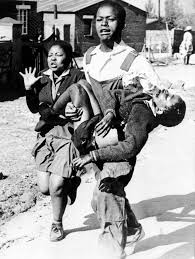South Africans are on Tuesday observing the 44th anniversary of the Soweto Students Uprising, with President Cyril Ramaphosa urging them to “build a more just, equal, and sustainable world at peace with itself.”
Officially known as Youth Day in South Africa, the 16th June 1976 uprising was triggered by the defunct apartheid government’s plans to introduce the dreaded Afrikaans as a language of instructions in classes attended by African students.
The students, however, would have none of this – they felt that using Afrikaans, a language of the oppressor, would oppress them further through education.
To express this anger with the apartheid government’s education plans, thousands of students took to the streets of Soweto in a protest that ended in the apartheid police killing at least 176 students on that fateful Wednesday morning.
The first of these students was Hector Petersen, whose limb body oozing blood from the mouth was carried by fellow student, Mbuyisa Makhuba, aged 18, as they rushed away from confrontation to seek medical help.
This was depicted in late photojournalist Sam Nzima’s iconic image which went viral worldwide.
The day, as some observers said, signalled the beginning of the end for apartheid.
The image of a bleeding Petersen, limb in Makhuba’s hands as his sister Melville Edelstein wailed alongside them, triggered a final backlash against the white minority government in the struggle against apartheid.
And, indeed, some 18 years later white minority rule and apartheid ended with Nelson Mandela becoming this country’s first black president – five years after his release from 27 years of imprisonment.
Ramaphosa, one of Mandela’s aides, has now succeeded his boss.
As he observed the 44th anniversary of the Soweto Uprising on Tuesday, Ramaphosa recalled: “Those of us who were part of student movements during the apartheid era are often asked what we think of the young people of today.
“There is a temptation to retreat into nostalgia about ‘the glory days’ of student politics and youth struggle, that they would never to be replicated.”
He noted that “just as the youth of yester-year defined their mission, today’s youth have defined theirs.”
“South African youth of 2020 more than meet the high standard set by their predecessors. They are optimistic, resilient and courageous, often in the face of the harshest of circumstances.”
The president challenged the youth to craft and design programmes that would make the country reach its developmental goals and address the current unemployment crisis.
He said his government would now be looking to the innovative and pioneering spirit of the youth to come up with solutions to the unemployment crisis – and that the solutions benefit them along with their communities.
The president observed that “throughout history young people have been a driving force for change.”
“In just the last few decades, young people have waged numerous struggles against injustice, from the 1968 student uprising in Paris, to the anti-war movement in the United States in the 1960s, to the anti-colonial struggle in many African and Asian countries, to the fight against apartheid, to the Arab Spring.
“Most recently, young people have been at the forefront of the #BlackLivesMatter movement that has gained global support in the wake of the killing of (African American) George Floyd in the United States.”
He said recent demonstrations in institutions such as Oxford University in England where students have called for the removal of British colonialist Cecil John Rhodes’ statue, just like those from South Africa did five years ago, showed that youth across the globe had found common cause.
“They are tearing down statues and symbols of racism, demanding the decolonisation of educational curricula, and calling for institutions to address racism and social exclusion.
“And so, as we pay tribute to the generation of 1976 on this Youth Day, we also salute the youth of post-apartheid South Africa, the worthy inheritors of this noble legacy.”
Citing the Presidential Youth Employment Initiative and the National Youth Service, the president said these programme showed that the government wanted to support the country’s young people to see their ideas through from incubation to opening the doors of their businesses.
He encouraged the youth to continue building a world that was more just, equal, sustainable and at peace with itself.
NM/jn/APA


